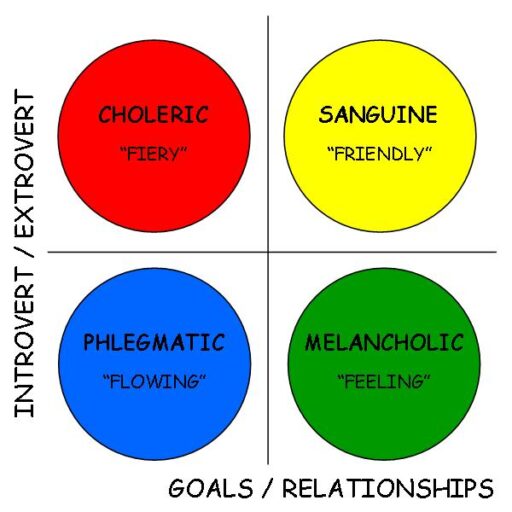
Have you ever wondered why people think, feel, and behave so differently? The answer often lies in the 4 types of temperament—a framework that has been studied for centuries to understand human personality. These temperaments not only shape how we interact with the world but also influence our relationships, decision-making, and emotional responses. In this blog post, we’ll take a deep dive into the 4 types of temperament, exploring their traits, strengths, and how they affect our daily lives. Let’s unravel the mysteries of personality together!
What Are the 4 Types of Temperament?
The 4 types of temperament are based on ancient theories of human behavior, developed by Hippocrates and later refined by modern psychology. These temperaments are:
- Sanguine
- Choleric
- Melancholic
- Phlegmatic
Each temperament represents a unique set of characteristics that define how a person thinks, feels, and acts. Let’s explore each one in detail.
1. The Sanguine Temperament
People with a Sanguine temperament are often described as lively, optimistic, and outgoing. They thrive in social situations and are natural entertainers.
Key Traits:
- Extroverted and cheerful.
- Highly creative and spontaneous.
- Easily distracted but quick to bounce back from setbacks.
Strengths:
Sanguines are excellent communicators and can light up any room with their charisma.
Challenges:
They can struggle with follow-through and may avoid serious or stressful situations.
2. The Choleric Temperament
The Choleric temperament is characterized by ambition, leadership, and high energy. People with this temperament are natural-born leaders who love taking charge.
Key Traits:
- Goal-driven and determined.
- Confident and assertive.
- Quick to anger but equally quick to forgive.
Strengths:
Cholerics excel in leadership roles and are highly motivated to achieve their goals.
Challenges:
They can be overly competitive or domineering, which may strain relationships.
3. The Melancholic Temperament
Melancholics are thoughtful, detail-oriented, and often introverted. They are perfectionists who value structure and consistency.
Key Traits:
- Analytical and logical.
- Deeply emotional and empathetic.
- Highly organized and detail-focused.
Strengths:
Melancholics are reliable, responsible, and excel at problem-solving.
Challenges:
They may overthink or become overly critical of themselves and others.
4. The Phlegmatic Temperament
The Phlegmatic temperament is calm, peaceful, and easygoing. These individuals seek harmony and avoid conflict at all costs.
Key Traits:
- Loyal and dependable.
- Introverted but warm toward close friends and family.
- Great at mediating and resolving conflicts.
Strengths:
Phlegmatics are excellent team players and bring a sense of calm to stressful situations.
Challenges:
They may struggle with procrastination or avoid taking initiative.
Why Understanding Temperaments Matters
Understanding the 4 types of temperament helps us build better relationships, communicate more effectively, and develop empathy for others. Whether you’re a manager looking to lead a team, a parent raising children, or someone simply curious about self-improvement, knowing your temperament and those of others can be a game-changer.
Conclusion
The 4 types of temperament offer a fascinating lens through which to view human behavior. By understanding these temperaments, we gain insights into ourselves and others, helping us navigate life with greater clarity and compassion. So, what’s your temperament? Share your thoughts in the comments below!